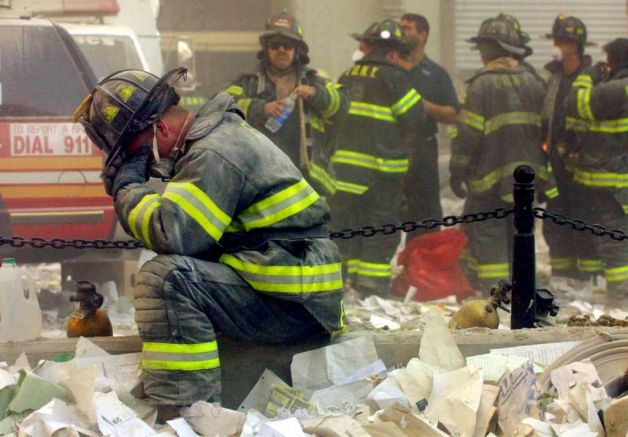You are here
Controversial Study Shows Higher Cancer Risk in 9/11 Firefighters
Primary tabs
Controversial Study Shows Higher Cancer Risk in 9/11 Firefighters
Sat, 2011-09-03 19:07 — Kathy GilbeauxCBS News - September 2, 2011

A firefighter breaks down after the World Trade Center buildings collapsed September 11, 2001 after two hijacked airplanes slammed into the twin towers in a terrorist attack. (Credit: Mario Tama/Getty Images)
(CBS) The 9/11 terrorist attacks in New York City killed almost 3,000 people, but what about New Yorkers who were in the area at the time but survived? New studies show they face heightened risk for asthma, post-traumatic stress disorder, and cancer - but not all health experts agree the attacks are to blame for survivors' health problems.
For one study - published in the September 1 issue of The Lancet - Mount Sinai researchers evaluated more than 27,000 police officers, firefighters, construction workers, and office workers who were in or around ground zero over the nine years following 9/11. The researchers found more than one in five responders had multiple physical or mental health illnesses.
"This is the first long-term study to demonstrate the lasting burden of disease experienced by the brave men and women who responded in the aftermath of the terrorist attacks at the World Trade Center," study author Dr. Juan Wisnivesky, vice-chair for research at Mount Sinai School of Medicine in New York City, said in a written statement.
Overall, 28 percent of participants had asthma nine years later, 42 percent have sinusitis, and 39 percent have acid reflux. Forty-two percent showed abnormal lung function, indicating a lung injury.
Rescue workers, not surprisingly, were hit harder than others in the area.
First responders who arrived on the scene were subjected to the worst levels of a dust and smoke concoction filled with harmful substances like jet fuel, asbestos, hydrochloric acid, and other caustic chemicals. Forty-eight percent of rescue workers had asthma, and 43 percent of them had acid reflux with at least one mental condition.
Ten percent of rescue workers suffer from asthma, acid reflux, and sinusitis simultaneously.
The mental health consequences are just as prevalent. Twenty-eight percent of rescue workers have depression, 32 percent experience symptoms of post-traumatic stress disorder, and 21 percent suffer from panic disorder.
"These men and women risked their lives and their health to support their fellow Americans after the devastation of 9/11," Dr. Philip Landrigan, principal investigator of the Mount Sinai World Trade Center program's data and coordination center, said in the statement. "Now, many of them are riddled with multiple health problems. Our study shows that these diseases may persist for years to come. We should do everything in our power to provide the best long-term care possible to these heroes."
What about cancer?
A different study - also published in the same issue of The Lancet - looked at cancer links among 10,000 firefighters - most of whom were exposed to caustic dust from 9/11 - and found they had a 19 percent higher risk of cancer than colleagues who were not exposed.
"This study clearly shows World Trade Center exposure in these firefighters led to an increase in cancer," Dr. David Prezant, chief medical officer for the FDNY, told Reuters.
The Associated Press, however, reports this 19 percent increase is not statistically significant, saying the increase could be attributed to chance.
"Is it a definitive study? No," peer reviewer Dr. James Melius, the administrator of the New York State Laborers' Health and Safety Trust Fund, told the New York Times.
Some experts, like Dr. Donald Berry, professor of biostatistics at the University of Texas M.D. Anderson Cancer Center, also questioned the evidence.
"Occupational hazards are real," he told the Associated Press. "But occupational risks accrue over years of exposure. With the exception of a nuclear explosion or meltdown, it's difficult for any single event to cause an increase in cancer or in mortality."
The Lancet has more on its 9/11 studies.
http://www.cbsnews.com/8301-504763_162-20100944-10391704.html

Recent Comments